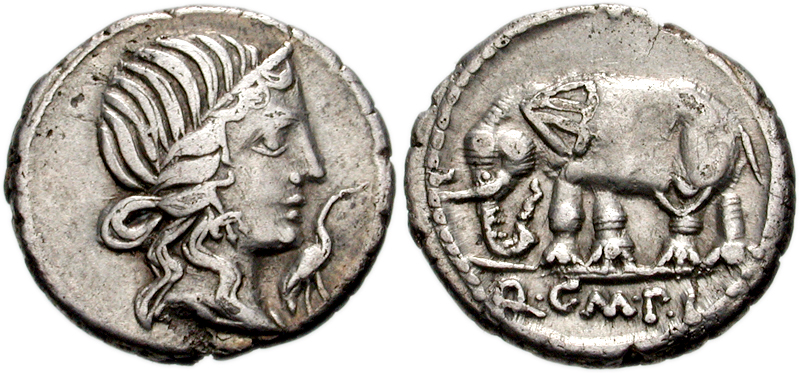Quintus Caecilius Metellus Pius
The son of Quintus Caecilius Metellus Numidicus, he worked as an ally of Sulla and was a successful general in the Social War and the Sertorian War.
 He was the son of Quintus Caecilius Metellus Numidicus. During his father’s command in Numidia during the Jugurthine War, he accompanied his father to Africa. After his father was banished in 100 BCE, he launched a campaign to have his father brought back from exile. Finally in 98 BCE, his work resulted in the passing of a law, which allowed his father to return. Because of his filial piety, he was awarded the agnomen “Pius.”
He was the son of Quintus Caecilius Metellus Numidicus. During his father’s command in Numidia during the Jugurthine War, he accompanied his father to Africa. After his father was banished in 100 BCE, he launched a campaign to have his father brought back from exile. Finally in 98 BCE, his work resulted in the passing of a law, which allowed his father to return. Because of his filial piety, he was awarded the agnomen “Pius.”
In the 90s, he was elected to the College of Pontiffs and regained some of his family’s eminence. At the beginning of the Social War, he served as a legate in 89 BCE and successfully won some battles against the Marsi. Because of his success, he was elected praetor in 88 BCE. During his praetorship, he enrolled the Italian allies as new Roman citizens within sixty days as part of the Lex Plautia Papiria.
During the Social War, from 88-87 BCE, he worked on the southern front. After his success against those in the Apulia region, he later marched to Rome and met up with Gnaeus Octavius , though the two leaders did not work well together. Though he first recognized Cinna as consul, when Cinna occupied Rome and Marius began his proscriptions, Metellus left for North Africa.
When he arrived in Africa in 86 BCE, he started raising an army in order to join Lucius Cornelius Sulla, an opponent to both Cinna and Marius. However, it was not until 83 BCE, that he was able to move to meet Sulla on the march to Rome. He was the main subordinate to Sulla. In 82 BCE he was sent with Pompey to northern Italy by Sulla. His alliance with Sulla was fueled more by a desire for power than an agreement with Sulla’s political stance. He was rewarded for his efforts as he was made Pontifex Maximus in 81 BCE and was elected consul alongside Sulla in 80 BCE.
When Sertorius began to gather strength in Hispania Ulterior, Metellus was sent to command the Roman forces against Sertorius in 79 BCE. However, his military expertise was of no match for Sertorius’ guerilla tactics, and he was repeatedly defeated. He was finally pushed out of the province, and the Senate in 77 BCE sent Pompey with another army to aid Metellus. They worked well together. Pompey focused on Sertorius, whereas Metellus focused on Pompey’s subordinates and gradually the war turned to the favor of the Romans. After the end of the war, he celebrated a triumph with Pompey in 71 BCE, though he himself was never able to conclusively defeat Sertorius. Despite his success working alongside Pompey, his politics allied him against the young, rising leader. Metellus died around 63 BCE.
→ Attalus Entry: Quintus Caecilius Metellus Pius19
→ Smith Entry
→ Wikipedia Entry